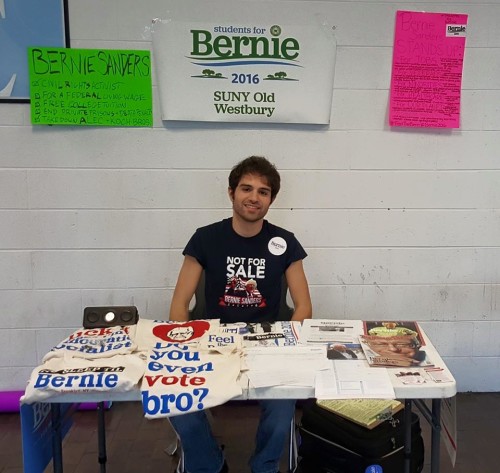
Steven Abreu, a junior majoring in special education, was threatened with arrest on March 24th by the campus police while he was registering voters in the Campus Center. He videoed the incident which immediately went viral on the Internet. At press time, it had 50,000 views on Facebook and 4,000 views on YouTube.
According to Abreu, Michael Dolan, director of facilities rentals, asked him if he had received permission from either Suzanne McLaughlin, director of the Center for Student Leadership and Involvement, or from Omar Estrada Torres, dean of students, to register voters on campus. Allegedly Dolan then advised Abreu that he had already been told that he was not allowed to continue. Abreu denies that he was ever told this.
In an e-mail correspondence obtained by The Catalyst, it appears that Abreu was only advised that he had missed the deadline to start a club for presidential candidate Senator Bernie Sanders.
The video picks up after university police were called, apparently by Dolan. On the video, Lieutenant Luis Llano and another officer appear to be telling the student he cannot continue to register voters without permission. Threatened by the police with arrest, Abreu put away pamphlets and other materials, picked up the table he carries to school for registration purposes, and ceased his activities.While the immediate impression may seem to point to the officers simply following through with a complaint made by a member of administration, several faculty did not see it that way. Dr. Hedva Lewittes, professor of psychology, can be seen in the clip attempting to engage university police and obtain information on what exactly was happening. Lieutenant Llano can be seen telling her to “not worry about it.”
Lewittes said later that Abreu’s tabling had always been peaceful and that the police should have de-escalated the incident. Lewittes said, “By the time I came on the scene the police had been called and the tense and adversarial nature of the incident made it impossible to come up with a practical resolution.”
Abreu contacted his attorney Jonathan Clarke about possible legal action which he says is for justice and not money. He said his lawyers came to the campus on March 24th and were unable to come to an agreement that day. Michael Kinane, assistant to the president for advancement, sent an email stating, “Until such time as any legal proceeding is confirmed or concluded, there will be no further public comment on this matter.” Thus, all members of the faculty and staff could not comment on the matter.
On March 24th, President Calvin O. Butts, III sent an email to the campus community advising that “today an event on campus occurred that may lead some to question the College’s commitment to the rights afforded under the First Amendment to the U.S. Constitution for those who attend and work at SUNY Old Westbury.
“As an institution of higher education, SUNY Old Westbury respects and supports the right to free speech. Designated public space is provided on our campus to those who follow the appropriate Use of Facilities policy and procedure, which is available on the College website.
“Discussions involving this event are ongoing and have my full attention.”
Clarke said that a law suit has not yet been filed. “I’m disappointed that the administration hasn’t already settled the matter,” he said. He added that the situation did not have to get to legal matters, that school officials should’ve allowed Abreu to exercise his rights and register voters. “Not only did they violate his [Steven’s] rights, but they also violated every student’s right who wanted to register to vote that day,” he said.
The language on the website for all SUNY schools and the OW website do not really address the specific situation.
The SUNY website states:“The New York State Election Law mandates that State University campuses develop a program to provide each student with a voter registration application at the beginning of each school year and during January and February of a presidential election year.” The site goes on to suggest having voter registration stations in areas of high traffic (a campus center perhaps?).
The SUNY OW website simply lists the Office of Services for Students with Disabilities as a recognized voter registration agency. According to the outpouring of support on social media sites, many people believe that Abreu was essentially doing a service that SUNY OW was mandated to do but wasn’t implementing.
While his support is clearly for Sanders, Abreu’s efforts to register voters were non-partisan and he believes the prevention of registering voters speaks to minority voter suppression in this country. “I’m Latino myself so I identify hugely with the diverse population at this school,” he said. “Many just check out of voting. That’s what disenfranchisement is.”
Since September, Abreu has registered 350 people to vote and the majority have been African-Americans and Latinos, according to him.
Through his recent tribulations at school, Abreu still praises his experiences in higher learning and at OW: “I’m fighting for justice because of what I learned here.”




